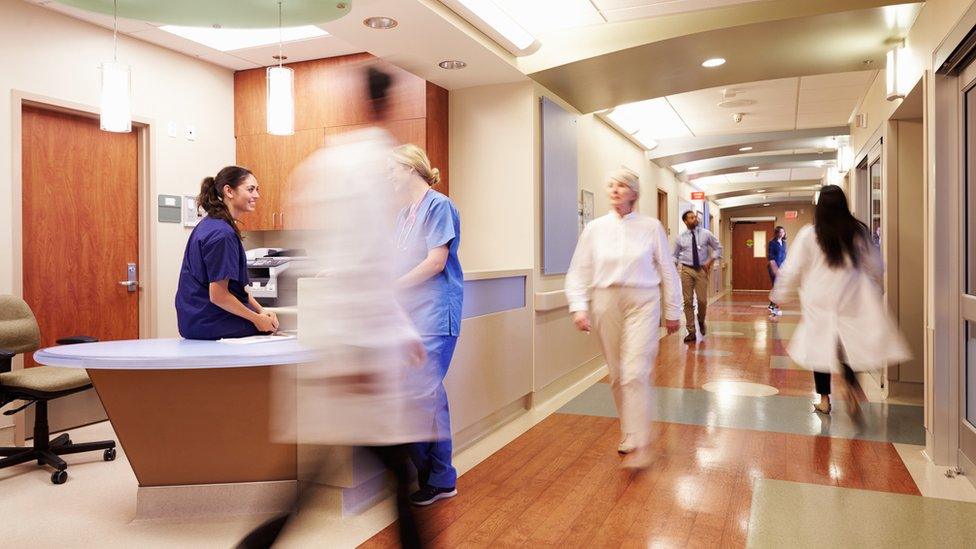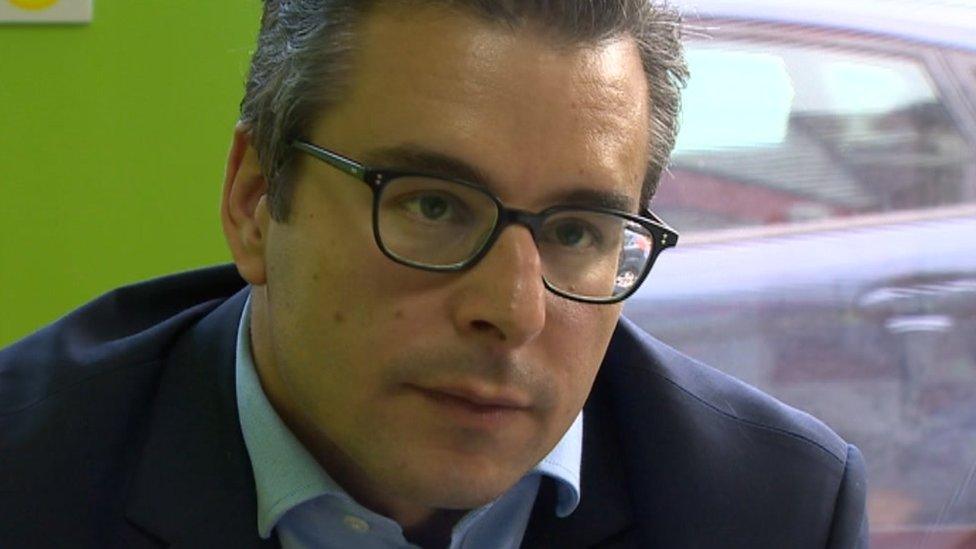NHS budget up £246m by 2030 due to EU migration, Vote Leave claims
- Published
MP David Davies MP says the predictions are a 'reasonable estimate'
The Welsh NHS would need an extra £246m a year by 2030 to cope with EU migration if the UK stays in the union, leave campaigners have said.
Tory Monmouth MP David Davies said forecasted migration would place "huge pressure" in the coming years.
The figures come from research published by Vote Leave Cymru.
But Wales Stronger in Europe said it was "shameful" for Mr Davies to promote "fantasy figures", based on the prospect of Turkey joining the EU.
Voters will decide in a referendum on 23 June whether Britain remains a member of the 28-country union, or leaves.
Mr Davies said if Albania, Macedonia, Montenegro, Serbia and Turkey all gained entry to the EU, it could see the UK population grow by five million in the next 14 years.
Vote Leave suggested that could result in as many as 131,000 people coming to Wales from the EU between 2016 and 2030.

It is forecasted that, as well as an extra £246m, the Welsh NHS would need to employ 328 additional doctors in Wales just to maintain current staffing levels.
Mr Davies added: "The Welsh NHS is already facing the challenge of an ageing population, and scarce resources, but future migration will inevitably place huge additional pressures on investment and standards of care.
"Rather than sending money abroad to countries that want to join the EU I believe we should be spending our money on local priorities here in Wales, and across the UK."
'Strengthening' service
Wales Stronger in Europe chairman Geraint Talfan Davies said: "These fantasy figures from Vote Leave contribute nothing to the debate except prejudice and discomfort - they are an insult to Welsh voters.
"It is shameful that David Davies - the chairman of a parliamentary committee - would put his name to this nonsense.
"He very well knows the UK has a veto on any new members and that Turkey is making next to no progress in completing the admission requirements."
Mr Talfan Davies added that with 100,000 EU citizens working in the NHS, migrants were "not straining it, they are strengthening it".
"Here in Wales, 9% of our doctors come from other EU nations and one-in-five of our care workers were born overseas," he said.
"Vote Leave would pull us away from this vital level of support and risk a recession that would mean less money to spend on services including the NHS."
He added: "The key point to remember is that Wales gets back £245m a year more than it gives to Europe."
Responding to the criticism, the Monmouth MP said the Leave campaign's figures were a "reasonable estimate" based on what happened when eastern European countries joined the EU, and that Prime Minister David Cameron had vowed to "fight very hard" for Turkey to join the EU.

Analysis by Nick Servini, BBC Wales political editor

It feels like the gloves are coming off in the referendum campaign in Wales.
The latest claims on the NHS are a big moment for the Leave side which is going big on arguably two of the most sensitive and emotive issues; immigration and the knock-on effect on public services.
David Davies says if Turkey joins the EU then net migration to Wales would be "astronomical."
In response, Wales Stronger In Europe called the figures "shameful" and contributed nothing except "prejudice and discomfort."
Vote Leave believes it has the remain camp rattled and that its campaign is reaching a turning point.
As ever, both sides have strengths and weaknesses.
The Vote Leave forecasts in population growth are well above the official estimates, but its campaigners know these have been way out of step in the past, and could be again.
And the Remain campaigners also know that the economy argument is central to the NHS, and they are looking to take advantage of the claim that a Brexit would harm tax revenues, and as a result, spending on health as well.
- Published24 May 2016
